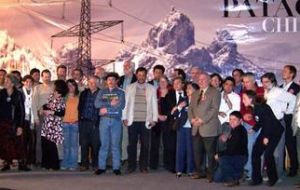MercoPress. South Atlantic News Agency
“Patagonia without dams” activists gather momentum
 The Chilean Patagonia Defense Council makes its presence known
The Chilean Patagonia Defense Council makes its presence known One week after Chile's top environmentalists gathered in Santiago for the launch of a new book called “Patagonia Sin Represas” (Patagonia Without Dams), activists from Patagonia held a ground-level version of the event in Coyhaique, Region XI
On Wednesday, Oct. 10, approximately 200 people assembled in the regional capital, where a host of speakers – some of them repeats from the Santiago event – expounded on the potential dangers of large-scale dam construction in Patagonia as proposed in the so-called Aysén Project. The Aysén Project is planned as a joint venture between Spanish electricity giant Endesa and Chilean energy company Colbún. Slated for Region XI's two largest rivers, the Baker and the Pascua, the 4 billion US dollars Aysén Project calls for construction of five massive hydroelectric dams that would – if approved by government environmental authorities – generate an estimated 2,750 MW of electricity. The Project also calls for construction of a 2,200-km transmission line to transport the electricity from Region XI, an area also known as Aysén, to Chile's energy-hungry central and northern regions. Opponents fear the dams and accompanying transmission line would be socially and environmentally devastating for pristine southern Chile. Approval of the Endesa-Colbún project, furthermore, would open the flood gates for further hydro-prospecting by other multinational companies. Indeed, a Swiss mining company called Xstrata has also expressed interest in building dams in the area. "Thanks for being here to support us and our cause," said Aquilino Olivares, a self-described "campesino" who lives near the Baker River. "As the son of pioneers, as the grandson of colonists, I am totally committed to defending our rivers, defending our customs, defending our lives." Proponents of the project say its 2,750 MW would go a long way toward meeting Chile's growing electricity needs, which are rising in excess of 6% annually. The project, say its backers, would also help alleviate Chile's vulnerability to ongoing shortages of Argentine natural gas, which Chile needs for electricity production. But opponents insist that Chile has more viable, environmentally friendly energy alternatives. "If we want to give Chile electricity, we have the (northern) desert where we can put up windmills and solar panels. And where I live, between the Nef and Baker Rivers, I supply myself with solar energy. I'm not destroying anything and I'm happy," said Olivares. Another speaker at the Coyhaique event was Juan Pablo Orrego, of the Santiago-based environmental NGO Ecosistemas. He argued that the planned hydroelectric dams are both an immediate environmental threat to the region and against the best interests of the country as a whole. Going forward with the Aysén Project, said Orrego, "means strengthening a primitive economic model that's high impact and is based on extraction (of resources). The companies that are demanding this energy are the very companies that pollute the most. "We need to move toward a new economic model that's based on offering services and other intangibles, such as ecotourism, culture, education and healthcare." Orrego, a central player in the ongoing campaign against the Aysén Project, co-edited "Patagonia Sin Respresas" with Patricio Rodrigo, executive director of the Chile Ambiente Corporation. Featuring a collection of essays by authors such as U.S. "eco baron" Douglas Tompkins, Salmon magnate Hugo Puchi and Hernán Sandoval, a one-time advisor to ex-Chilean President Ricardo Lagos, the book offers a wide range of written and visual arguments against construction of the huge hydro project. The Santiago and Coyhaique book launches, in addition to bringing renewed attention to the ongoing Aysén Project controversy, also served as a coming out party for the recently formed Chilean Patagonia Defense Council (CDCP). An umbrella organization made up of several dozen Chilean and international groups opposing dam construction in Patagonia, the CDCP represents the largest and most organized effort yet to block the Endesa-Colbún project. CDCP members include Orrego's Ecosistemas, Chile Sustentable, the Region XI-based Citizen Coalition for Aysén Life Reserve and U.S. NGOs Natural Resources Defense Council, International Rivers Network and the Sierra Club, among others. By Benjamin Witte The Santiago Times




Top Comments
Disclaimer & comment rulesCommenting for this story is now closed.
If you have a Facebook account, become a fan and comment on our Facebook Page!